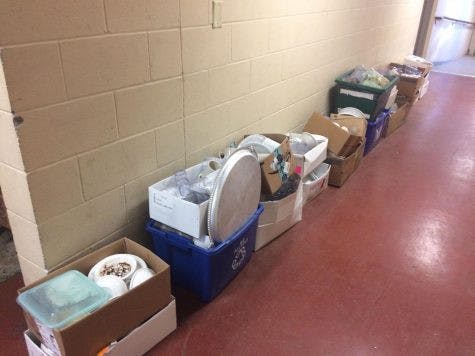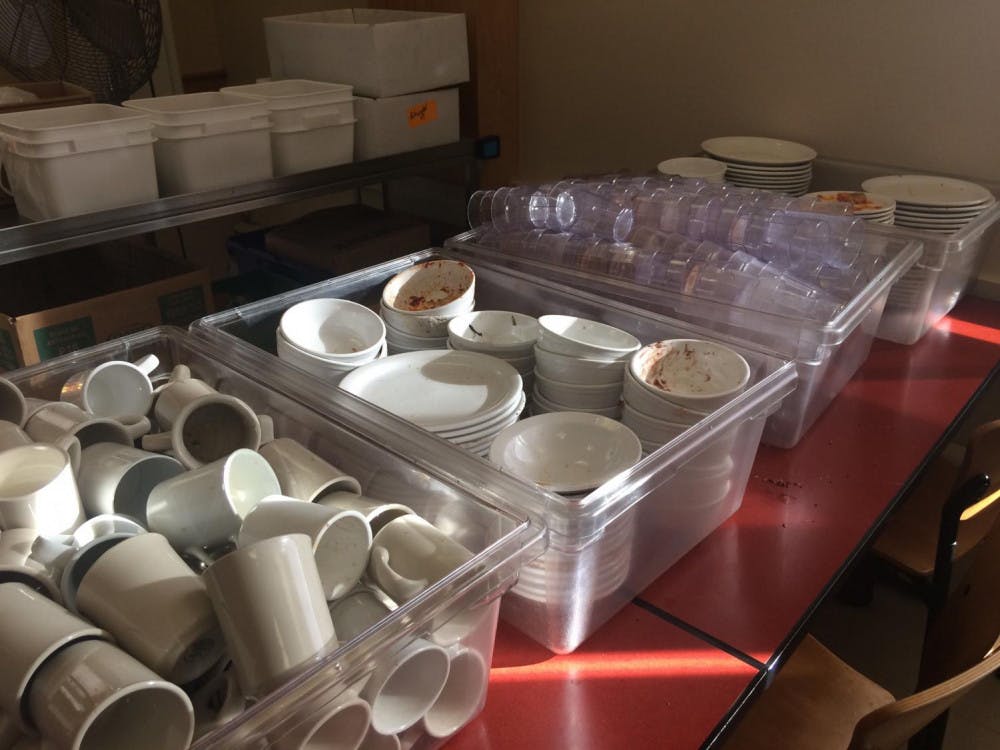Middlebury dining halls generally accommodate students’ desires to eat where they want. Whether that means taking plates of food outside when it is sunny, eating in Proctor Lounge or deciding to take food back to a dorm room, students have freedom to dine where they choose.
College staff say that oftentimes students abuse this privilege, creating a nightmare scenario for custodians in the process. Many students opt to abandon dirty plates and silverware in dorm bathrooms, hallways and kitchens. Some students even throw dirty dishes in the trash.
Missy Beckwith, the associate director of Facilities Services, said that this is a persistent problem that adds significant unpleasant work for staff who end up collecting dishes from residential spaces.
“These dishes tend to attract bugs and rodents and begin to smell,” she said. “So, while it is not expected that custodial teams return the dishes or even pick them up, they do.”
Cindy Webb, a custodian who works in Hadley Hall, said she leaves whatever dishes she may find for a few days to see if a student will pick them up before she does so herself. Webb also confirmed that she often finds dishes in the trash, even though she works in a dorm attached to Ross Dining Hall.
[pullquote speaker="Cindy Webb" photo="" align="center" background="on" border="all" shadow="on"]Just in my trash bin over in the middle of second floor Hadley, I pulled out 14 cups, two plates and a bowl in two days.[/pullquote]
“Just in my trash bin over in the middle of second floor Hadley, I pulled out 14 cups, two plates and a bowl in two days,” she said. “The last few years I felt like it had tapered off and then for whatever reason this year it’s worse again.”
Webb estimated that about 80 percent of the dishes she comes across while making her rounds in the dorms are in the garbage.
Even when custodians see dishes in the trash, Beckwith said they are not supposed to remove them for health and safety reasons.
“The contents of the average trash or recycling bin can be hazardous — broken glass, improperly disposed needles, pathogens,” she said. “While the custodial staff wears gloves when removing trash, it is unreasonable to ask them to suit up in the personal protective equipment required to rummage through a bag of trash.”

At the end of Winter Term, the dining halls recieved nearly 1,700 pounds of dishes that students had abandoned and thrown away across campus.
While custodians like Webb who work in Ross are able to return recovered dishes directly to the dining hall, custodians in other dorms are not able to fit such trips into their already busy schedules. Instead, they typically place dorm dishes on the curb with the trash to be taken down to the Recycling Center.
There, waste management workers set the dishes aside in storage bins. They also open up trash bags and sort through the garbage, pulling out any plates, cups or silverware they see and storing them alongside the dishes picked up from other locations.
According to Waste Management Supervisor Kim Bickham, once the bins are full, they send the dishes back up the hill to the dining halls. Bickham said that on average half of the dishes they see are in the trash and half have been collected elsewhere.
“We bring them back to the dining halls once a month, or more often if we have to,” Bickham said. “We return on average 600 to 700 pounds of dishes a month.”
Executive Director of Food Service Operations Dan Detora said that at the end of Winter Term the dining hall received far more dishes than usual — a whopping 1,700 pounds. Detora said that big returns like that often happen before breaks.
[pullquote speaker="Kim Bickham" photo="" align="center" background="on" border="all" shadow="on"]We return on average 600 to 700 pounds of dishes a month.[/pullquote]
When dishes arrive from the Recycling Center they are uniquely difficult to clean after having been stored with food on them for weeks.
“They have to soak at least two days, at least, because they are filthy,” he said. “Then we run them through the dishwasher once or twice, typically twice because they are just nasty.”
Randy Bushey works in the dishroom in Ross and helps when dishes arrive from the recycling center.
“A lot of them come back with mold and stuff. They are really really disgusting and I don’t think people understand or know that,” Bushey said. “There’s times where the aroma just fills the room and I have to leave to go get my breath.”
He said the hardest food to get off month-old plates is fried eggs.
Some of the dishes are so dirty and moldy that they are unsalvageable and have to be thrown away. This, along with normal wear and tear, causes Dining Services to spend up to $20,000 a year on replacement dishes.
Webb pointed out that this wastes both money and resources. “The dining hall has a budget. That’s what they have to work with,” she said. “Do you want to have quality food? Or do you want to just keep buying dishes? And to think about the impact on the environment too, how much ends up in the landfill, it’s kind of ridiculous.”
Dining Services and Facilities have struggled to solve the problem. A few years ago, Detora said they added the dish racks outside of Ross and Proctor to make it easier for students to return dishes after hours.
Detora also said they created the to-go box program in the hope that students would remove fewer plates from dining halls, but it has not made much of a difference.
Webb said that the college used to impose fines on hallways that left dishes out, but she raised concerns about the fairness of that practice.
[pullquote speaker="Cindy Webb" photo="" align="center" background="on" border="all" shadow="on"]Do you want to have quality food? Or do you want to just keep buying dishes?[/pullquote]
“I seriously objected to that because I felt that students that could not afford to pay their portion of the fine would be the ones that would end up picking the dishes up,” she said.
Others, including Cook Commons Coordinator Francisca Drexel, think that students should be prevented from removing dishes from dining halls in the first place.
Or, as Detora pointed out, students could fix this problem by returning their dishes.
“I get it, students are busy. But I really wish they would just bring back their dishes,” he said. “It would be a tremendous help to a whole lot of people if they would just bring their dishes back on a regular basis. And if they want something to go, get a to-go container. That’s the whole idea of the program.”
1,700 Pounds of Dining Dishes Go Unreturned

COURTESY PHOTO
Comments



